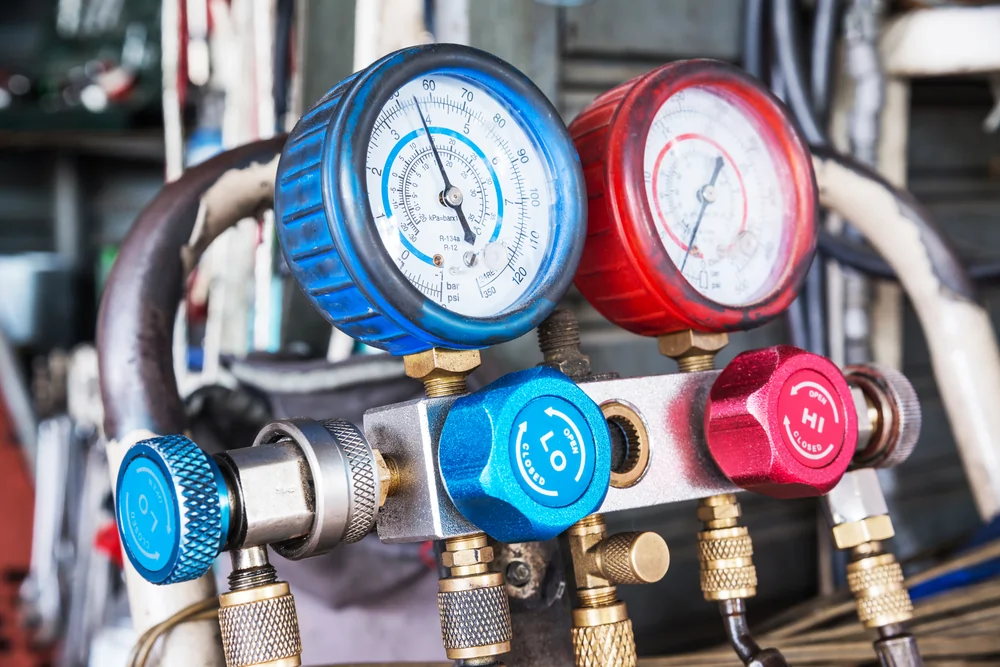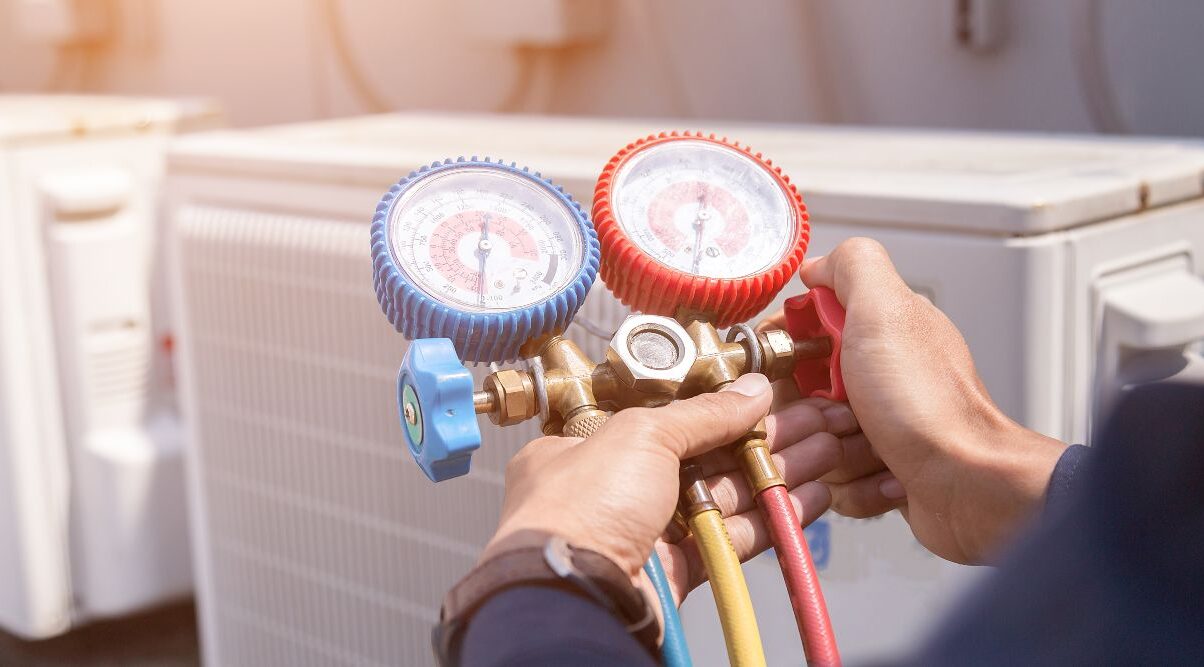In fact, as an HVAC tech, you need so many different types of tools to do your job right. From the basics to the specialty tools to everything in between, these are appliances you don’t want to forget at home when hitting the road to your next gig. Better put them in one toolbox or vest that you can carry everywhere or simply in your truck – as long as it’s within reach.
Before we get started, it’s worth emphasizing that 25 tools are not too much, especially considering that your competitors probably have the same toolset.
We suggest you read the list carefully to see what is needed to get your jobs done and to save time, for you and for your customers.
Ready? Here’s what you need to get started:
The Basics: Hand tools
1. Screwdrivers
Probably the most basic item—a kit of insulated screwdrivers with different size heads is a must for any HVAC tech out in the field. Make sure to have both a Phillips head and a flathead in the kit so you’re ready for any type of screw.
*Note: When you’re working with electrical wires and equipment, be sure to use insulated tools. They not only save you from getting an electrical shock, but they also protect the equipment you’re repairing.
2. Pliers
You can never have too many tools in your arsenal for a day’s work. Keep handy a full set of insulated pliers, which includes needle nose, linesman, channel lock, and wire strippers to name just a few; this will ensure that you’re ready for any task at hand! To make the job even easier on yourself try finding an all-inclusive tool with these features like our Open Face Linesman combo or Needlenose Combo Tool – it’ll enable you to get through jobs more efficiently than ever before.
*Note: Whenever possible, purchase multi-task tools to save space in your tool vest and gain more convenience on the job.
3. Hammer
A hammer is another one of those basic tools that every HVAC technician should keep in his tool vest. A lightweight hammer with an easy grip should do the trick without weighing down your tool belt.
4. Wrenches
Every good handyman needs to have the right tools. Here are a few of those essential wrenches: small, medium, and large for any repair situation that may come your way (including pipes attached to furnaces).
A pipe wrench is necessary if you need assistance with plumbing attachments on furnaces or other areas where pressure-fitting can be an issue.
5. Cutters
Metal and tubing cutters are important for cutting through anything on the job. A wider set of cutters will enable you to cut through a greater variety of tubing.
6. Industrial-grade extension cord
Don’t rely on a standard household extension cord. You need a durable, industrial-grade extension cord to support the usage of heavy power tools.
7. Step ladder
Keep a step ladder in your work truck as you’ll need it for most jobs.
HVAC Specialty Tools
8. Thermometer
Taking correct temperature measurements like reading air differences, superheat, and subcooling is essential for tasks for HVAC technicians. Even a one-degree error could make the difference between adhering to regulations or not. Like other HVAC tools, there are plenty to choose from including pocket thermometers, infrared thermometers, and digital HVAC thermometers. You can find out more about the differences here.
9. Reciprocating Saw
A reciprocating saw can cut through many materials, from drywall to sheet metal. The Sawzall is known for its trademark name and you have the choice between a cordless or corded version that fits your needs. For more information about this powerful tool, visit Bob Well’s article on Sawzalls here. For research purposes, check out Bob Well’s article on Sawzalls here.
10. Vacuum pump
An effective vacuum pump removes contaminants and unwanted water from the refrigerant system by sucking the air and moisture from its components and preventing future damage. It’s important to use the vacuum prior to testing and repairing the system. Find the best vacuum pumps with reviews here.
11. Manifold Gauge
Used to monitor heating and cooling systems, manifold gauges control the flow of pressure or gas and help you to determine if there’s a problem in the system. HVAC gauges are sold as either small handheld devices or as bigger machines for use in a professional HVAC shop. Not every manifold gauge is created equal. For detailed reviews, you can check out this article on manifold gauges.
12. Caulking Gun
You’ll need a caulking gun for sealing ducts and filling holes. But don’t go for the cheaper models. For a few dollars more, get yourself a caulking gun that will make your life easier, not harder. Research the features your need, and consider purchasing one with the following perks:
- A dripless design so that when you release the trigger the caulking does not continue to ooze out.
- A cutter so that you can cut the cartridge tip to create a comfortable opening size without overdoing it or cutting yourself.
- A higher ratio to gain more thrust and to prevent hand and wrist fatigue.
13. Drill
To get through tasks faster, a cordless, battery-powered drill should be kept charged with multiple bits in your tool bag. For a list of the best drills on the market, check out this article.
14. Core Removal
A core removal tool will help you remove the service core valve to maximize the flow of refrigerant during recovery, evacuation, and recharge. It can potentially save you hours on the job.
15. Multimeter
HVAC technicians must evaluate whether or not the motor, pump, control board, or compressor is working properly. An HVAC multimeter provides voltage, amperage, resistance, and temperature readings, enabling you to determine if the above are functioning. It also serves as a safety device allowing you to check for live wires.
16. Leak Detector
A leak detector can identify areas with moisture so you can locate the source of a leak. There are four major types of leak detectors:
- Corona discharge.
- Heated diode.
- Infrared.
- Ultrasonic.
The type you need will be determined by the job. You can learn more about the differences here.
17. Coil Fin Straightener
The fins that rest on the air conditioner condenser can get bent resulting in poor airflow. Using a fin straightening, you can repair the fin as well as remove the dirt and debris. While inexpensive, it’s important to choose the right one (so it does not cause any more damage.) Check out this article detailing different types and brands.
18. Thermal Imaging Tools
To diagnose problems quickly with little information, you can use a thermal imaging camera to identify and troubleshoot issues like air leaks, water leaks, and electrical problems. With early detection, these problems can prevent more expensive issues for the customer later on. To understand better how it works, read this article.
19. Hand Seamers
For bending or flattening metal by hand, hand seamers are another useful tool.
20. Psychrometer
A psychrometer measures humidity by taking both a wet-bulb and dry-bulb temperature reading. To evaluate how well air conditioning is actually functioning, the psychrometer enables you to measure the condition of the air. For a more detailed explanation of how it works, check out this video.

HVAC Safety Tools
21. Gloves
To prevent cuts and lacerations, wear heavy-duty gloves You can review a variety of different gloves here.
22. Safety glasses
You can block shards of metal and glass as well as chemicals from entering your eyes by wearing industry-approved safety glasses
23. Earplugs
When using power tools, wear earplugs to avoid damage to your hearing.
24. Heavy-duty work boots
Because HVAC technicians are on their feet most of the day, a comfortable, durable, and lightweight boot are important. For a list of the best boots, read this review.
HVAC business tools: Field service management software
25. HVAC dispatch, scheduling, and management software
More and more HVAC service techs are transforming their business with HVAC dispatch, scheduling, and management software. Everything that you once wrote down on paper, maintained in a spreadsheet, or dealt with over the telephone can now be more efficiently managed in an HVAC business software like Workiz. Go digital with lead and client management, scheduling and dispatching of jobs, and invoicing.
Make your life easier by staying up to date
Remember, the best HVAC tools are up to date. They have been recreated to better serve you and to prevent injuries or fatigue on the job. The newest digital tools on the market will save you time troubleshooting issues, will enable you to provide more value to your clients, and will help you to maintain a competitor’s edge.









